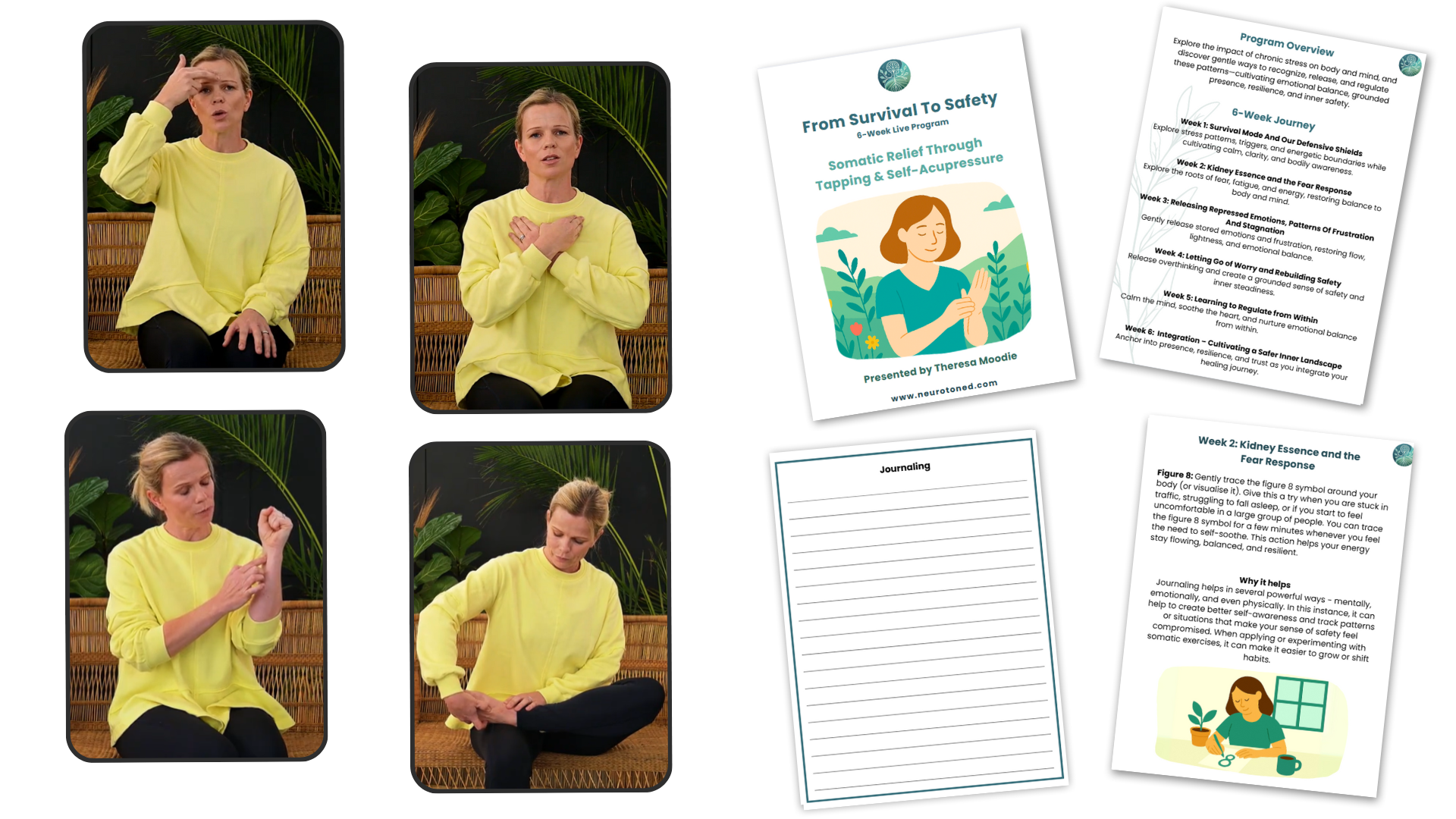
Hydration for Nervous System Regulation: How Water Helps You Feel Safe Again
If your body often feels on edge or exhausted for no clear reason, hydration might be part of the story. Even slight dehydration can make your nervous system act like it’s in danger, heightening stress and anxiety signals.
Take the Stress Loop Quizto learn how your body reacts to stress and find out which gentle reset may help you feel grounded again.
In short:
Hydration is one of the simplest ways to support your nervous system. Every nerve impulse relies on electrolytes moving through water in your body. When you’re dehydrated, those signals can falter, leading to fatigue, irritability, and heightened stress. Restoring fluid balance helps your body return to safety and regulation faster.
Why Hydration Matters for Nervous System Regulation
Your brain is nearly 75% water, and your nerves depend on fluid to carry their messages clearly. When you lose even a little water, your body produces more cortisol, your stress hormone, which can trigger that wired-and-tired feeling.
Many people who describe feeling “ready to jump out of their skin for no reason” are actually experiencing mild dehydration combined with a chronically activated stress response. Learn more about this pattern in Why Do I Always Feel Ready To Jump Out Of My Skin For No Reason?.
Dehydration can also make it harder to recover from emotional surges like panic attacks. If that’s something you experience, explore What Are Panic Attacks? Why Do They Happen? Can I Stop Them? for an understanding of how physical stress and emotional overwhelm interact.
Signs You Might Be Dehydrated (Even If You’re Drinking Water)
- Sudden irritability or tension
- Brain fog or feeling spacey
- Dull headaches or muscle tightness
- Racing heartbeat or shallow breathing
- Cravings for sugar or salty snacks
Sometimes, these sensations aren’t emotional but physiological. They often lessen within 20–30 minutes of slow, steady hydration.
If you often experience physical sensations tied to stress, The Connection Between Psychological and Physical Pain may help you understand how the body and mind mirror each other.
How to Rehydrate for Calm and Clarity
1. Start your day with water before screens
One glass before checking your phone signals your nervous system that the day starts in safety, not urgency.
2. Add natural electrolytes
A small pinch of sea salt or squeeze of lemon can help your body absorb water more efficiently. This supports smoother nerve communication—similar to how vagus nerve stimulation exercises calm the body through balanced electrical signaling.
3. Sip mindfully
Instead of gulping large amounts, take small, consistent sips throughout the day. This keeps electrolytes balanced and reduces the body’s sense of fluctuation between “too little” and “too much.”
4. Eat hydrating foods
Cucumbers, citrus, soups, and herbal teas are gentle, water-rich options that also soothe digestion—an area strongly connected to emotional regulation. To explore this link, read The Gut-Brain Connection and Trauma, Simply Explained.
5. Pair hydration with breath
Each time you sip, take one slow exhale. Hydration plus breath gives your body two simultaneous cues of safety.
A 7-Day Gentle Hydration Reset
| Day | Focus | Simple Practice |
|---|---|---|
| 1 | Awareness | Notice how your mood changes after each glass of water. |
| 2 | Consistency | Keep a visible bottle near your workspace. |
| 3 | Electrolyte Support | Add lemon or sea salt once daily. |
| 4 | Integration | Sip during slow breathing or stretching breaks. |
| 5 | Nutrition | Include one hydrating food per meal. |
| 6 | Rhythm | Replace one caffeine drink with herbal tea. |
| 7 | Reflection | Observe if your energy feels more steady. |
If you want to pair hydration with deeper grounding, try this 10-Minute Nervous System Reset for Overwhelm.
Common Sticking Points
“I forget to drink.”
Pair drinking with routines—like brushing teeth or making coffee. Habit stacking works better than alarms.
“Plain water feels boring.”
Infuse with mint, cucumber, or berries. Ritualizing hydration turns it from task to care.
“I drink plenty but still feel tired.”
You might need electrolytes. Try a small pinch of salt or coconut water once daily.
“I overdrink and feel bloated.”
Slow down. Let your body absorb before taking more. The nervous system relaxes through rhythm, not force.
For more strategies on nervous system balance, see How To Widen Your Window of Tolerance Daily.
More Gentle Reads
-
Grounding During Panic Without Talk Therapy: A Gentle Guide You Can Use Anywhere
-
Why Deep Breathing Makes Me More Anxious, And What To Do Instead
FAQs
1. How does dehydration affect anxiety?
Dehydration raises cortisol and adrenaline, which may heighten feelings of anxiety or tension.
2. How much water should I drink daily for nervous system health?
Most people do well with around 6–8 cups of fluids, but tune in to your thirst and climate rather than strict numbers.
3. Can tea or coffee count as hydration?
Herbal tea counts, but caffeine may mildly dehydrate, so balance it with extra water.
4. Why do I feel dizzy or lightheaded when dehydrated?
Low fluid levels can lower blood pressure and slow nerve signaling, leading to dizziness.
5. Does electrolyte water help with stress?
Yes, balanced electrolytes support nerve communication and may reduce stress reactivity.
6. Is thirst a reliable signal?
Not always. Many people become desensitized. Build small reminders before you actually feel thirsty.
Disclaimer:
This article is educational and not medical advice. If you have health concerns, consider speaking with a qualified professional.
Discover Your Vagal Tone
Find out how dysregulated your nervous system is and get your personalized roadmap to feeling calm, energized, and in control


